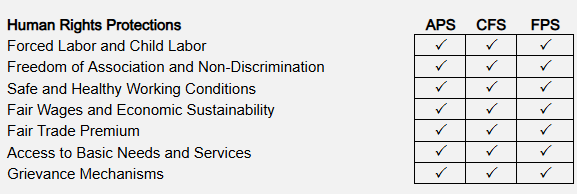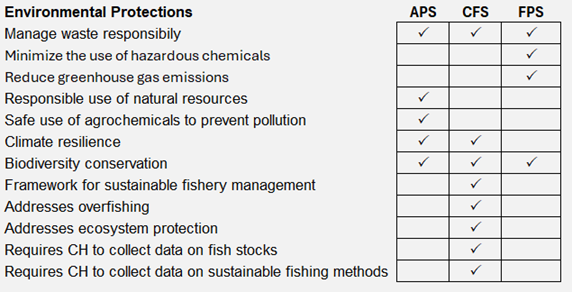HREDD in Fair Trade USA Standards
The Human Rights and Environmental Due Diligence (HREDD) framework is designed to help businesses proactively identify and address adverse human rights and environmental impacts. Across sectors, all three Standards contain provisions that reflect these key principles, ensuring that the supply chains in agriculture, fisheries, and factories are socially responsible and environmentally sustainable.
Fair Trade USA’s Agricultural Production Standard (APS), Capture Fisheries Standard (CFS), and Factory Production Standard (FPS) integrate key principles of HREDD. These standards not only address critical labor and environmental protections but also incorporate mechanisms for risk assessment, corrective actions, and preventive measures, ensuring alignment with the HREDD framework as developed by the UN Guiding Principles on Business and Human Rights and OECD Guidelines. In addition to embedding these principles in the standard requirements and the systems and processes to support year-round compliance, these requirements are verified annually by a neutral third party, providing assurance that HREDD principles are being met.
1. Human Rights Protections

Forced labor, bonded labor, and child labor are prohibited. The standards ensure compliance with international labor conventions, requiring clear documentation and monitoring to safeguard vulnerable workers.
Workers across agriculture, fisheries and factories are guaranteed the right to organize and engage in collective bargaining without discrimination, fostering equitable labor environments. Fair Trade USA Standards align with international conventions to prevent discrimination based on gender, ethnicity, race, or other protected categories.
Across sectors, Fair Trade USA Standards promote and enforce robust occupational safety requirements. This includes appropriate training and safety equipment for workers to prevent accidents and ensure health and mitigate risks in production environments.
The Standards also require that farmers, fishers, and workers receive fair wages, promoting economic security and ensuring that income meets or exceeds legal minimum wage This directly aligns with HREDD’s focus on ensuring workers’ rights to fair remuneration and an adequate standard of living.
The Fair Trade Premium is paid to farmers, fishers and workers also contributes to community economic development, creating a safety net that strengthens livelihoods.
In addition, our Standards require that farmers, workers and fishers have access to basic services like clean water, sanitation, and adequate housing when provided by employers. These requirements support workers’ right to an adequate standard of living, which includes access to food, water, and shelter, and align with HREDD’s focus on ensuring dignity and wellbeing for all workers.
Grievance mechanisms are in place to allow workers and fishers to raise concerns and resolve disputes in a fair and transparent manner. These mechanisms help provide access to remedies for any human rights violations or non-compliance issues that may occur within certified entities.
2. Environmental Protections

- The FPS integrates environmental management systems into factory operations. Factories must manage waste responsibly, minimize the use of hazardous chemicals, and reduce greenhouse gas emissions.
- The APS includes environmental protections in the APS focus on sustainable agricultural practices, promoting the responsible use of natural resources, such as water and soil, and the safe use of agrochemicals to prevent pollution.
- The CFS provides a comprehensive framework for sustainable fishery management, addressing overfishing, biodiversity loss, and ecosystem protection. It requires certified entities to collect data on fish stocks and apply sustainable fishing methods that minimize bycatch and ecosystem damage. The standard also includes waste management practices, reducing the environmental impact of fishing operations, both on vessels and in land-based facilities.
- Both the APS and the CFS standards emphasize biodiversity conservation and climate resilience, although the CFS places a greater emphasis on ecosystem management due to the unique challenges faced by marine environments.
Risk Assessment in Fair Trade USA Standards consistent with HREDD
The risk assessment processes in the APS, CFS, and FPS Standards are consistent with HREDD principles, ensuring that risks related to human rights violations and environmental harm are identified, assessed, and mitigated.
1. Identification of Risks:
- All three Standards require the implementation of an Internal Management System (IMS), which is crucial for identifying risks related to labor conditions, environmental practices, and compliance with certification requirements. The IMS requirements in Fair Trade USA Standards ensure that regular risk assessments are conducted to identify potential violations or harmful practices.
2. Prioritization and Corrective Actions:
- The risk assessment procedures prioritize critical areas such as forced labor, child labor, and environmental degradation. Once risks are identified, all three Standards mandate corrective actions to address these issues immediately.
- In fisheries, this includes improved stock management techniques to prevent overfishing and destruction of marine habitats, while in agriculture, it focuses on enhancing land and water use practices to preserve soil health and prevent water contamination.
3. Preventive Measures and Continuous Improvement:
- Fair Trade USA Standards emphasize preventive measures, encouraging ongoing monitoring and training to ensure long-term compliance with both human rights and environmental regulations. The standards align with HREDD’s focus on continuous improvement through progressively stricter requirements, aiming for long-term sustainability.
- For instance, the CFS requires fisheries to work towards internationally recognized best practices in fishery management over time.
Additional Training & Capacity Building Provided by Global Field Team
Fair Trade USA Producer Services supports this framework. Providing these services is essential for ensuring that Certificate Holders (CHs) not only comply with the standards but also effectively integrate human rights and environmental protections into their operations.
- Training and Capacity Building: Producer Services offers training to help producers, fisheries and factory managers understand how to conduct risk assessments, implement corrective actions, and adopt best practices in human rights and environmental protection. This enhances the ability of CHs to integrate HREDD requirements into their operations.
- Technical Support: Through technical assistance, producers, fisheries and factory managers are guided on how to improve working conditions, manage natural resources sustainably, and comply with Fair Trade USA Standards.
Conclusion
Fair Trade USA’s APS, CFS and FPS reflect a strong commitment to the principles of HREDD. Through structured risk assessments, corrective actions, and preventive measures, these standards ensure that businesses comply with global expectations for human rights and environmental sustainability.